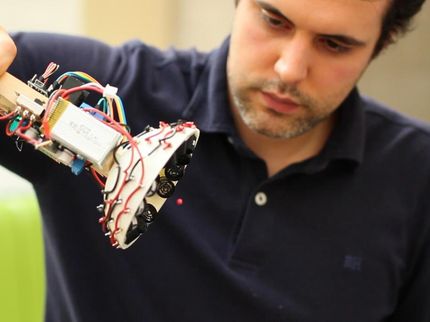Tiny lasers from a gallery of whispers
Whispering gallery mode (WGM) resonators are used to make tiny micro-lasers, sensors, switches, routers and other devices. These tiny structures rely on a phenomenon similar to an effect observed in circular galleries, such as in some cathedrals or museums, where sound waves travel across the gallery and are reflected and refocused tightly enough that a whisper on one side can be heard on the other.
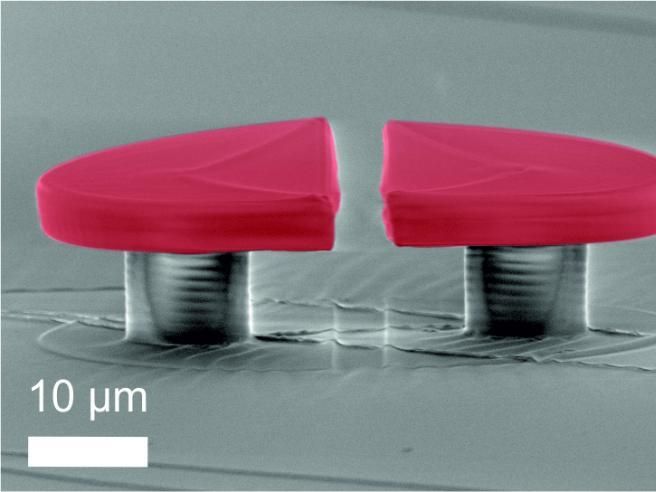
Scanning electron micrograph of a polymeric WGM split-disk cavity: Two opposing half-disks (R=25μm) with an intermediate air gap of several microns are structured onto an elastomeric PDMS substrate with direct laser writing.
Tobias Siegle, Karlsruhe Institute of Technology
The same phenomenon applies to light. When light is stored in ring-shaped or spherical active resonators, the waves superimpose in such a way that it can result in laser light. This week investigators report a new type of dye-doped WGM micro-laser that produces light with tunable wavelengths. Not only is the tuning range of the new devices broader than has been possible in the past, it is completely reversible.
A unique feature of the design, according to lead author Tobias Siegle of Karlsruhe Institute of Technology in Germany, is that tuning is made possible by changing the size of a flexible substrate. Stretching the substrate changes the distance between the two sides of the split disk in the resonator and thus, the wavelength of the light produced.
The disk itself is typically about 25 microns across, with an initial gap between its two halves of roughly 2.5 microns, just 3 percent the diameter of a typical human hair. The disk is mounted on an elastomer, or stretchy plastic substrate, which can be pulled in a direction perpendicular to the disk's split, decreasing the gap size. The light produced by these micro-lasers shifts toward the blue range of the spectrum when the gap size decreases. They observed wavelength shifts of several nanometers in the visible range.
"Our new design produces a broad tuning range that cannot be easily achieved with other WGM resonators," Siegle said. "Additionally, the tuning mechanism is completely reversible."
This feature allows the device to be used in fundamental optics research. Another feature of the split-disk technology is enhanced sensitivity in refractive index sensing.
"For a gap width of 1.4 microns, the sensing performance is increased by 65 percent," Siegle said, when comparing to a reference disk resonator without a gap.
The most useful devices have a low lasing threshold, since this allows the use of small amounts of energy. A low threshold reduces or prevents photo-bleaching of the dye molecules used in the device and increases its expected lifetime. The investigators tested their design and found low-threshold lasing for split disks fabricated using a 3-D or electron-beam lithography technique.
Another quantity they studied is the quality, or Q factor, which corresponds to the photon storage time in the laser cavity. A high Q value is desirable, and although investigators found that their split-disk design reduced Q somewhat, the lasing threshold was within an appropriate range, making the design valuable.
Future work will be focused on developing tunable coupled resonator waveguides, which can be used as optical delay lines or filters, and in other applications.
Original publication
Other news from the department science
These products might interest you
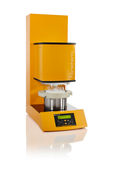
FIBRETHERM by C. Gerhardt
Automatic Fibre Extraction for Feed Analysis
FIBRETHERM from C. Gerhardt: Efficient – Precise – Method-Compliant
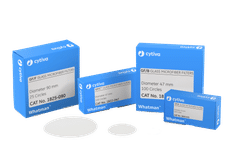
Glass and quartz microfiber filter by Cytiva
Request a glass microfiber sample pack to meet your battery development needs
Delivering efficient and consistent results
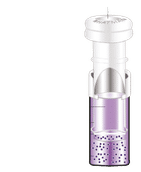
Mini-UniPrep™ by Cytiva
Improved HPLC Sample Preparation
Save 66 % sample preparation time and reduce costs by 40 %
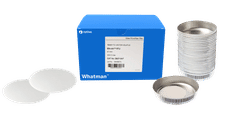
GF/C and 934-AH RTU (Environmental) by Cytiva
Meet wastewater regulations with the right filter
Streamline lab operations and ensure high-quality results
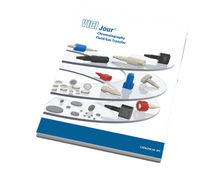
VICI Jour Katalog 15INT by VICI
The VICI Jour Catalog - Accessories for (U)HPLC and Liquid Handling
Capillaries, Tubing, Fittings, Filters, Safety-Products, Tools and much more
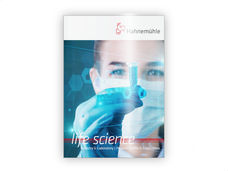
Hahnemühle LifeScience Catalogue Industry & Laboratory by Hahnemühle
Wide variety of Filter Papers for all Laboratory and Industrial Applications
Filtration Solutions in the Life Sciences, Chemical and Pharmaceutical Sectors

Whatman filtration product guide by Cytiva
New filtration catalog - a wealth of information on 286 pages
Discover the perfect filters for your laboratory application

Get the chemical industry in your inbox
By submitting this form you agree that LUMITOS AG will send you the newsletter(s) selected above by email. Your data will not be passed on to third parties. Your data will be stored and processed in accordance with our data protection regulations. LUMITOS may contact you by email for the purpose of advertising or market and opinion surveys. You can revoke your consent at any time without giving reasons to LUMITOS AG, Ernst-Augustin-Str. 2, 12489 Berlin, Germany or by e-mail at revoke@lumitos.com with effect for the future. In addition, each email contains a link to unsubscribe from the corresponding newsletter.

